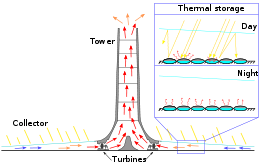
The solar updraft tower (SUT) is a design concept for a renewable-energy power plant for generating electricity from low temperature solar heat. Sunshine heats the air beneath a very wide greenhouse-like roofed collector structure surrounding the central base of a very tall chimney tower. The resulting convection causes a hot air updraft in the tower by the chimney effect. This airflow drives wind turbines, placed in the chimney updraft or around the chimney base, to produce electricity.
As of mid 2018, although several prototype models have been built, no full-scale practical units are in operation. Scaled-up versions of demonstration models are planned to generate significant power. They may also allow development of other applications, such as to agriculture or horticulture, to water extraction or distillation, or to remediate urban air pollution [citation needed].
Commercial investment may have been discouraged by the high initial cost of building a very large novel structure, the large land area required, and the risk of investment.[1] A few prototypes have recently been built[2] in Spain in 1981, in Iran in 2011, and in China in 2010 (see below), and projects were proposed for parts of Africa, the US and Australia.
In 2014, National Geographic published a popular update, including an interview with an informed engineering proponent. A solar updraft tower power plant can generate electricity from the low temperature atmospheric heat gradient between ground or surface level and structurally reachable altitude. Functional or mechanical feasibility is now less of an issue than capitalisation.[1] A comprehensive review of theoretical and experimental aspects of solar updraft tower power plant (SUTPP) development is available, recommending commercial development.[3] A review of progress in demonstration and modelled data was presented in 2020 by Dogan Eyrener, and included in publication of proceedings.[4] A review of combined technologies to address intermittency of power output, of hybrid solar updraft tower with complementary technologies was published in 2022.[5] Combined, multiple or hybrid technologies include combined updraft-downdraft towers,[6] and solar updraft-gas turbine waste heat transfer.[7]
- ^ a b Grose, Thomas K. (17 April 2014). "Solar Chimneys Can Convert Hot Air to Energy, but is Funding a Mirage?". National Geographic Society. Archived from the original on May 2, 2021.
- ^ Arzpeyma, Mazdak; Mekhilef, Saad; Newaz, Kazi Md. Salim; Horan, Ben; Seyedmahmoudian, Mehdi; Akram, Naveed; Stojcevski, Alex (July 2020). "Solar chimney power plant and its correlation with ambient wind effect". Journal of Thermal Analysis and Calorimetry. 141 (2): 649–668. doi:10.1007/s10973-019-09065-z.
- ^ Zhou, Xinping; Xu, Yangyang (2016). "Solar updraft tower power generation". Solar Energy. 128: 95–125. Bibcode:2016SoEn..128...95Z. doi:10.1016/j.solener.2014.06.029.
- ^ Uyar, Tanay Sıdkı, ed. (2020). Accelerating the Transition to a 100% Renewable Energy Era. Lecture Notes in Energy. Vol. 74. doi:10.1007/978-3-030-40738-4. ISBN 978-3-030-40737-7.[page needed]
- ^ Ahmed, Omer K.; Algburi, Sameer; Ali, Zaid H.; Ahmed, Amer K.; Shubat, Hawazen N. (November 2022). "Hybrid solar chimneys: A comprehensive review". Energy Reports. 8: 438–460. doi:10.1016/j.egyr.2021.12.007.
- ^ Abdelsalam, Emad; Almomani, Fares; Ibrahim, Shadwa (June 2024). "An innovative twin-technology solar system design for electricity production". Energy Reports. 11: 153–163. Bibcode:2024EnRep..11..153A. doi:10.1016/j.egyr.2023.11.027.
- ^ Mirzamohammad, Amin; Eftekhari Yazdi, Mohammad; Lavasani, Arash Mirabdolah (11 July 2023). "Improvment of combined solar chimney power plant with gas power plant". Scientific Reports. 13 (1): 11220. Bibcode:2023NatSR..1311220M. doi:10.1038/s41598-023-38464-4. PMC 10336099. PMID 37433847.